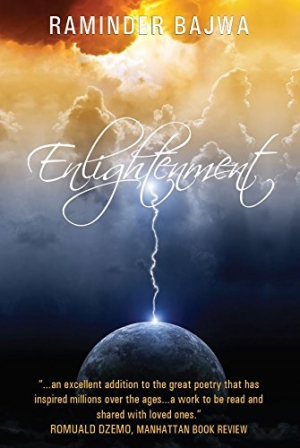Enlightenment
A mixture of religious and secular themes makes this poetry collection enjoyable and insightful.
Poet Raminder Bajwa aims for the big picture in his new poetry collection, Enlightenment, surveying the vicissitudes of love, truth, and divinity with clever rhymes and classical imagery. Accessible, funny, and occasionally profound, Enlightenment is a pleasant read for anyone who enjoys formal verse.
Most poems adhere to an aabb rhyme scheme, allowing for quick turns of phrase and pointed wit. Thematically, the book is divided into five sections: “Love,” “Truth,” “Secrets,” “Prayers,” and “Enlightenment.” Classical tropes of love poetry are in play, as are elements of religious odes and wisdom literature. The poems’ titles are set in a decorative typeface, which, despite enhancing the classical feel of the collection, can be hard to read.
Poems move along with natural musicality, though they are overly dependent on clichés at times, dragging some of the higher poetic aspirations into mediocrity. For example, in “Cheers!” life is equated to a “journey that never ends,” while in “Magic,” a speaker addresses a lover who stole his heart “like a professional thief.” Reliance on old tropes also results in some derogatory stereotypes. “Women” reads like a shallow litany of preconceived feminine attributes: “Married or single, her favors with charm you have to win. / But a real woman supports her man through thick and thin.”
The best lines reframe classical themes with fresh, modern energy. In “Greatest Poem Ever Written,” love is a “business of loss, not gain.” In “Gorgeous Chaos,” life is “a dark race.” The best poems of the collection are delightfully subversive. “My Small Home,” for instance, presents a private slice of domesticity as a wedge against the overbearing world: “Where friends may drop in at odd hours; / may discuss rebellion against the powers.” “The Tavern” replaces temples and churches with the proverbial watering hole, describing a place where the corrupt “have a conscience” and “the wicked are full of repentance.”
In a strange yet effective way, these poems blend traditional religiosity with secularism. They reject religious dogma and religious-inspired violence while still seeking divinity in the world. God becomes “the unlawful, inexplicable one,” not to be found in institutions, “but in a broken heart.”
The poems also borrow from wisdom literature traditions by using proverbs and maxims. “Life’s a Dream” describes experience as a figment of God’s imagination—“Everything’s an illusion, as if a song”—and concludes with a surprisingly succinct maxim on human kindness: “Be right. Be polite. / To dream doesn’t mean you bring others slight.”
Despite its stylistic and thematic trappings, Enlightenment offers just enough verve and originality to make the collection as a whole enjoyable and insightful. Bajwa is a poet who hails back to another age, and promisingly addresses current issues as well.
Reviewed by
Scott Neuffer
Disclosure: This article is not an endorsement, but a review. The publisher of this book provided free copies of the book and paid a small fee to have their book reviewed by a professional reviewer. Foreword Reviews and Clarion Reviews make no guarantee that the publisher will receive a positive review. Foreword Magazine, Inc. is disclosing this in accordance with the Federal Trade Commission’s 16 CFR, Part 255.

